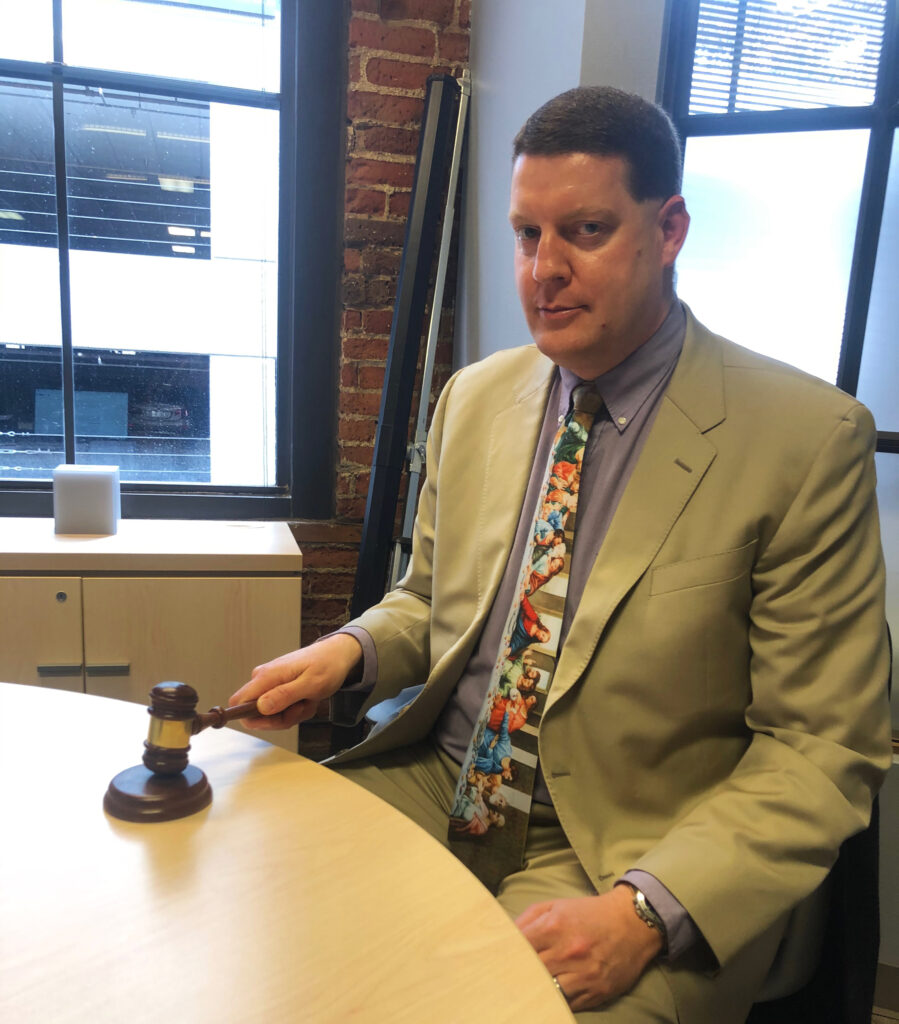 Most people I know, including my attorney friends, don’t want to go to court. They all tend to think: “The less people end up in court, the better.” I will focus on avoiding court as it relates to estate planning in this blog. When I first meet with people, many of them tell me that they want to set up a will so that their estate does not go through probate when they pass away. Since that is not a correct statement, I have found many tactful ways to let them know that is not technically right, and that rather than avoid probate, a will guides the probate process. Of course, I also will talk to them about what the probate process is, and what it isn’t.
Most people I know, including my attorney friends, don’t want to go to court. They all tend to think: “The less people end up in court, the better.” I will focus on avoiding court as it relates to estate planning in this blog. When I first meet with people, many of them tell me that they want to set up a will so that their estate does not go through probate when they pass away. Since that is not a correct statement, I have found many tactful ways to let them know that is not technically right, and that rather than avoid probate, a will guides the probate process. Of course, I also will talk to them about what the probate process is, and what it isn’t.
Probate is the process of proving a will, to make sure it is good, valid, and acceptable. Probate is also the legal process of getting assets out of the deceased person’s name and into the name of the heirs or beneficiaries. Probate does involve the courts, but a probate proceeding does not need to look like how most people might imagine a court trial. There are usually no attorneys, no witnesses, and no need to appear in a courtroom and stand in front of a judge for a probate proceeding. Instead, most probate proceedings are more like checking in at a government agency, like registering a car, or paying property taxes.
With proper planning, a will can guide probate and keep the court’s involvement to a minimum. A properly constructed and executed will makes probate more of an administrative action, rather than what people imagine court to be. By setting up a proper will, most of the time your survivors can handle probate proceedings by themselves. Using a probate attorney may be helpful, or necessary, sometimes, but under normal circumstances you likely will not need a probate attorney. Of course if you want to avoid probate altogether, there are ways to do so. You can use a combination of beneficiary designations and a beneficiary’s deed, or you can use a trust. Either approach should avoid probate and the courts entirely.
A Will Does Not Avoid Probate, but a Will Usually Makes Probate Easier
 As I said above, a will goes through probate. However, the process can be fairly simple and straightforward if you have a will. If someone who dies has a will, then the deceased’s survivors, especially the named personal representative of a will, need to take the will to the probate court. The personal representative will need to apply for probate by filling out the proper forms and submitting them to the court. In Colorado, you can find the necessary probate forms on the Colorado Judicial Branch Website, as the JDF forms for probate. The personal representative will receive permission from the probate court to act on behalf of the deceased person to transfer assets out of the deceased person’s name and into the name of the beneficiaries, or heirs. This permission is usually in the form of what are called “Letters Testamentary” or “Letters of Administration.” These documents are simply names for the written authorization from the probate court for the personal representative to act on behalf of the deceased individual.
As I said above, a will goes through probate. However, the process can be fairly simple and straightforward if you have a will. If someone who dies has a will, then the deceased’s survivors, especially the named personal representative of a will, need to take the will to the probate court. The personal representative will need to apply for probate by filling out the proper forms and submitting them to the court. In Colorado, you can find the necessary probate forms on the Colorado Judicial Branch Website, as the JDF forms for probate. The personal representative will receive permission from the probate court to act on behalf of the deceased person to transfer assets out of the deceased person’s name and into the name of the beneficiaries, or heirs. This permission is usually in the form of what are called “Letters Testamentary” or “Letters of Administration.” These documents are simply names for the written authorization from the probate court for the personal representative to act on behalf of the deceased individual.
Most wills can go through an informal probate process, which is more like an administrative action than a true legal action, or trial as described above. Instead, the personal representative will need to do the following: 1. apply for probate, 2. inventory assets and give the inventory to the court, 3. pay off debts, and then 4. come up with a final accounting and distribution amounts to the named beneficiaries, or heirs. This is provided to the court, and then the probate case can be closed out. The personal representative can check in which the court, but is not directly supervised in what the personal representative is doing. Instead, the personal representative can follow the will’s directions and carry out the personal representative’s duties with a minimum of supervision.
Not Everyone Needs a Probate Attorney
 Because a personal representative can act mostly independently, the personal representative can often act without needing to hire a probate attorney to represent the personal representative and carry out the will’s instructions in probate. Certainly a personal representative can hire a probate attorney if needed. However, if a personal representative can do most things without needing an attorney, then the personal representative can save the cost of a probate attorney. Most probate attorneys that I know ask for a $3,000 – $5,000 retainer to start a probate case. That said, if a personal representative can do the work without needing an attorney that can save you a lot of money.
Because a personal representative can act mostly independently, the personal representative can often act without needing to hire a probate attorney to represent the personal representative and carry out the will’s instructions in probate. Certainly a personal representative can hire a probate attorney if needed. However, if a personal representative can do most things without needing an attorney, then the personal representative can save the cost of a probate attorney. Most probate attorneys that I know ask for a $3,000 – $5,000 retainer to start a probate case. That said, if a personal representative can do the work without needing an attorney that can save you a lot of money.
There are situations in which a probate attorney is necessary. If there are some sort of creditor claims, or claims against the estate from a government entity like Medicaid, a probate attorney can be essential. If someone challenges a will, then having a probate attorney is something a personal representative will want to have. If these types of situations arise, a personal representative can always hire a probate attorney to handle the probate proceedings. I do not handle probate myself, but I can certainly recommend friends who do handle probate administration and probate litigation.
You Can Avoid Probate Entirely
 For people who want to avoid probate entirely, there are several options available.
For people who want to avoid probate entirely, there are several options available.
If your assets allow you to use a beneficiary designation, then you may designate an individual, or group of individuals, or an entity to receive that asset. Common asset types that have beneficiary designations include retirement plans – IRAs/401(k)s/403(b)s/TSPs/Other retirement plans – life insurance, and even many investment accounts allow you to designate a beneficiary. You can also name a beneficiary for a bank account. In Colorado, there is also a beneficiary’s deed, which is a deed that allows you to designate a beneficiary for your real estate assets. If you want to use this option, you need to ensure all of your accounts have such designations, and have a will as a backup plan if an asset does not have a beneficiary designation.
Another option is to use a trust. A trust is a legal arrangement where you can put your assets into a trust and describe where the asset should go after you pass away. By using a trust, you can consolidate all of your assets into one place, and have the trust control the assets. So long as you title assets in the name of the trust, you can have everything consolidated in one spot, which makes it easier to distribute assets after your death. The trust does not die along with you, but continues to exist. A person called a successor trustee can take over management of your trust after you die, and distribute assets to the named beneficiaries in the trust. The successor trustee gets authority to act from the trust documents, instead of needing to go to the probate court to get such authority. Trusts help you avoid the need of going through probate.
The Right Approach is Up to You
The best part of all of this is that you can choose the approach that works best for you. If you want to avoid the court and probate entirely, a trust is the way to go. If you don’t want to set up a trust, but still don’t like probate, you can choose the beneficiary designation route. Lastly, if you just want to have a plan in place, and want to minimize the time spent in court, a will can accomplish that. Talking about the options available, and helping you determine which is best for you is a large part of what an estate planning attorney is all about you. If you would like to discuss your situation and which options would apply best to you, you can make an appointment by going here.

 720-730-7274
720-730-7274









